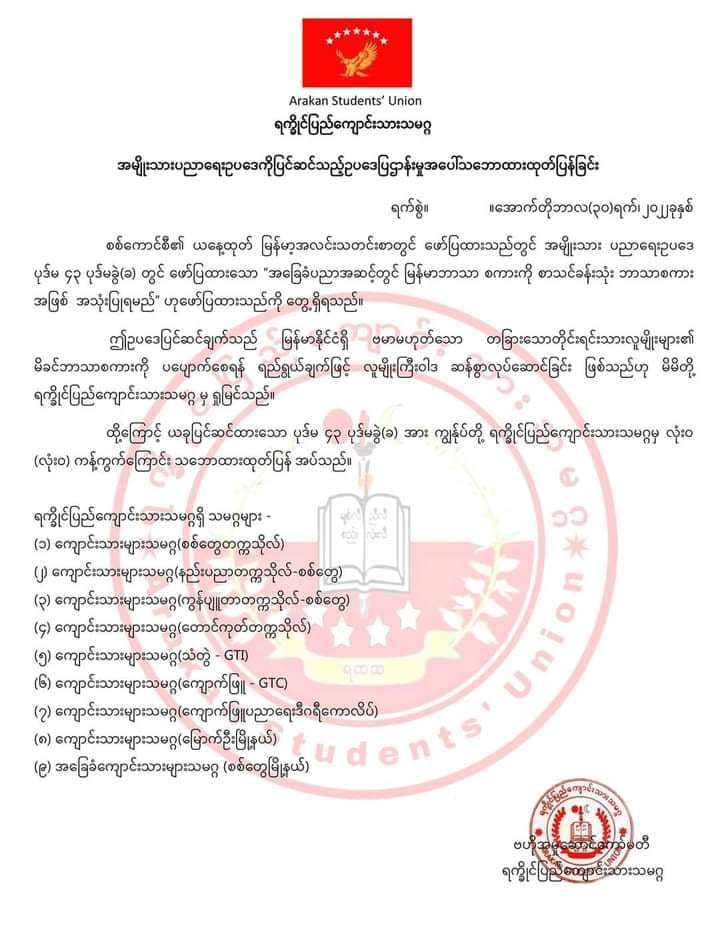Yangon, November (4)
Ethnic leaders and student unions have criticized the Regime’s amendment to the National Education Law as an attempt to permanently activate the military dictatorship and only to Burmanize ethnic language literature in the education sector.
On October 29, the coup military council announced that it had revised the National Education Law passed by the Union Hluttaw in 2014.
The Military Council amended that Myanmar language shall be used as the classroom language at the basic education level in Sub-Section (b) of Section 43 of the National Education Law.
Under U Thein Sein administration, in June 2015, according to Sub-Section (b) of Section 43 of the National Education Law, “Ethnic languages can be used together with Burmese as classroom languages at the basic education level.
In March 2015, the Democratic Education Strike broke out and demanded 11 points to amend the National Education Law enacted by the Union Hluttaw, claiming that there is no more freedom of education.
Former student leader of the All Burma Federation of Student Unions, Ko Min Thwe Thint, who participated in the democratic education strike, criticized the law amended by the Military Council as “Burmanizing” ethnic language literature in the education sector.
According to Article 419 of the 2008 Constitution, the Military Council amended the National Education Law, which is not allowed by law, and it is a dictatorial model of all aspects of health, education, administration and legislation practiced by successive military dictators.
On October 30, the Rakhine State Students’ Union issued a statement stating that it completely opposes the amended Sub-Section (b) of Section 43 as it is aimed at eradicating the mother languages of non-Burmese ethnic groups in Burma, as it is a form of chauvinism.
Mawlamyine University Students’ Union President Min Than Zin Oo said, “the National Education Law based on the 2008 Constitution was never accepted, and that revising the law like this was an act of Burmanization.
“This banning the literature and language of an ethnic group does not kill people with weapons, but commits genocide in other ways.”
Article 44 of the original National Education Law stipulates that “in regions or states, the teaching and learning of indigenous literature and languages is allowed to be implemented from the elementary level of basic education through the program of the relevant regional or state authorities and gradually expanded.”

The law prepared by the Military Council restricts the step-by-step expansion of the education program by stating that “the teaching and learning of indigenous literature and languages in regions or states can only be carried out at the basic education level through the program of the relevant region or state authorities.”
Khun Myint Tun, chairman of the Pao National Federal Council (PNFC) said that since the military council is an illegal organization, it cannot amend and enforce the law without the parliament, and the banning of ethnic languages harms the establishment of a federal union.
Article 5, revised by the Military Council, states that the government must constitute a National Education Commission, and that those involved in the government sectors, such as ministry, teacher education sector, technical and vocational sector, are allowed to participate in the commission.
Representatives of non-governmental ethnic groups, student unions and teacher unions were excluded in the formation of the National Education Commission.
After the military coup, laws already passed by the Union Hluttaw are continuously being amended and enforced by the Military Council without the Hluttaw in accordance with Article 419 of the 2008 Constitution.
On October 28, the Military Council enacted the Organization Registration Law, which carries a maximum penalty of five years in prison and a fine of up to 50,000 kyats, as well as confiscation of the funds and assets belonging to the association as state property.
News – Than Lwin Times

